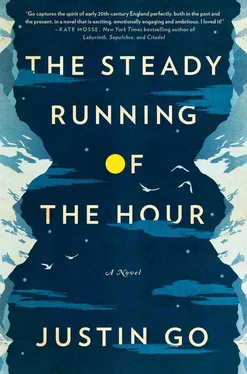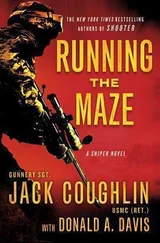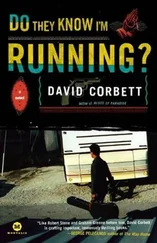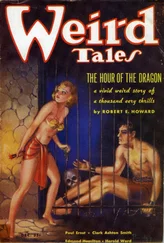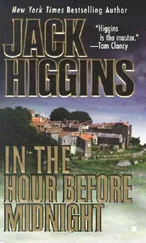— What you know for sure, I whisper. That’s all that counts.
I run my hands through my hair, rehearsing the details step by step. In the winter of 1916 Eleanor is living on this lake near Leksand. Imogen is almost certainly here too, because I found letters addressed to her in the old house. Around the same period, in December 1916, an art-supply dealer in Paris fills an order for paints made out to “M. Broginart” and the receipt ends up here. In May 1917 my grandmother Charlotte is born here. In March 1919, five months after the end of the war, at Eleanor’s request a gallery employee in London destroys a painted study recently shipped from Sweden, in spite of the fact that Broginart wants to buy the study and a related larger painting. The same month a painting by Eleanor titled Nude Study is entered in the Devereux Brothers ledger, only to be crossed out.
She could have painted a million things here. She could have painted the trees or the sky, the red house or any damn thing that would be a waste of time for me to chase after. But why have it destroyed? What could be so bad that even after it had reached London it had to be destroyed at once?
— That doesn’t make it Imogen.
I look at the receipt again. Broginart had bought Eleanor materials in Paris in 1916, so they must have had some kind of relationship to each other. She may have been painting something for him, or he may have been a collector of her work, which would explain why he wanted the study two years later. Or Broginart may simply have been a friend who bought the paints as a favor, because they were better than anything Eleanor could get in wartime Sweden. But what happened to the larger oil painting? Did Broginart ever get it, and if he did, what did it look like?
If Broginart was a serious collector his papers might have been saved. His collection could still be in Paris, or he might even have owned a gallery with surviving records of its own. His address is on the receipt and I know the exact dates I’m interested in, so I’d have a starting point. But Prichard would probably say it’s a waste of time, because even if I found the painting and it was Imogen, even if it showed her pregnant—
A voice is calling from outside.
— Tristan? You’d better come down now, unless you want to swim back.
I gather my things and run down the hill, catching up with Karin. Everyone else is already in the boat. Christian hitches the dinghy onto the aluminum boat with a length of nylon rope. He pulls the starting cord on the outboard motor and the engine belches to life, sputtering black smoke. The boats glide forward.
The Swedes pass around cans of beer. Karin sits down beside me.
— Do you want a ride down to Stockholm?
— That’d be great.
Karin smiles. — It beats rowing. Did you copy all those letters?
— Yeah.
— What was in them?
I drag my hand in the cold lake. I shake my head.
— You’ll have to read them. There’s a lot of stuff in there, it’s hard to explain.
— Are they good letters?
— Yeah. They’re good letters.
Christian cuts the motor as we near the muddy lakefront. It’s only noon, but it’s a long drive back to Stockholm. I hope I can get a flight to Paris tonight.

20 August 1916
All Saints’ Church
Sutton Courtenay, Berkshire
Beneath the night sky the churchyard is a mass of shadows. Imogen strides two paces before him though the ragged grass. Ashley’s shoe clips something hard and he nearly falls. Imogen stifles a laugh.
— Haven’t you been here before?
— We never came here, Ashley whispers. My mother had some aversion to the priest. I was baptized at Abingdon.
— Well, we’ve entered the graveyard. There’s no fence on this side. Mind the tombstones — some of them are quite short.
Ashley takes a final swig from the champagne bottle and pitches it into a clump of bushes. He does not need any more. He has no idea how much Imogen has drunk; for her it makes no difference. He quickens his step to catch up and they walk single file through the maze of lichen-covered headstones. Imogen is unafraid and speaking louder now.
— I had a lovely tour of the villages. Did you know there are German prisoners working the fields on the other side of the river, past the abbey? I tried talking to them—
— Not in German, I hope.
— Naturally in German. They were from Saxony, awfully nice fellows. They told me they’d prefer a month of harvesting to an hour back in the trenches. Said they hadn’t heard a women speak German in months. Of course, the guards overheard me and I spent a quarter of an hour convincing them I wasn’t a foreign agent. Gave them the name of every monarch since the Conqueror, I expect. Then I walked down to the church. The old sexton was cutting the grass here and he told me all kinds of bosh about the church’s history. He showed me something inside and I knew I had to show it to you.
As they approach the church Ashley sees the black mass of the nave, a square tower looming above.
— Are we meant to break in? I doubt they leave the door unlocked. And I don’t fancy being cashiered before I reach France.
— The door will be open, she calls back.
— It will not.
They follow the perimeter of the church toward the front entrance. As she walks Imogen runs her fingers along the rough walls, feeling for the gaps between each stone. They reach the front portal, an arched wooden door set at the tower’s base. Imogen puts her hand on the door’s iron ring. She smiles at Ashley.
— Do you trust in me?
— In nothing else.
Imogen turns the ring and pushes the door. It swings open with a creak.
— After you, Lieutenant.
It is dark in the nave. Only a faint shimmer of starlight passes through the stained glass above. They walk abreast of each other toward the altar, but they do not touch. By accident Ashley’s hand grazes hers and he reaches for her palm. She dashes away.
— I shan’t kiss you in a church. I may not believe in God, but I still fear him.
— And what are we here for?
Imogen reaches the altar, taking the steps in one stride. She plucks a ceremonial candle and tosses it underhand toward him.
— Catch.
Ashley puts up his hands to receive the candle, but her aim is wildly off and it bounces on the floor. He retrieves the candle and Imogen walks back down the center aisle toward the entrance. On her way she lifts a chair and carries it with her.
— This way.
Ashley follows dutifully behind her, the candle in his hand. Imogen sets the chair before the front portal and steps onto it.
— Light the candle, please.
Ashley strikes a match and at once the darkness recedes before the yellow flame. He lights the candle and passes it to Imogen. She holds the flame close against the beam that frames the top of the portal, running her hand over the dark wood.
— Here it is.
Ashley squints, but he sees only a beam of gnarled wood.
— The sexton said this is a perfectly typical fourteenth-century church. But even a typical church has its bits of interest.
She steps off the chair.
— Your turn, she says. Stand up.
Ashley takes the candle and holds it up to the beam. He sees the carvings now, thrown into sharp relief by shadows cast under the flame. They are crosses. Carved long ago upon the seasoned oak, there are square Greek crosses and Latin crucifixes, some finely wrought, others hewn crudely against the grain.
— Crusaders, Ashley murmurs.
Imogen repeats to Ashley what the sexton told her in the afternoon. She says that hundreds of years ago crusaders stopped at this very spot before they sailed for Constantinople. They knelt and prayed here, she says, and they heard a priest tell them they would go to God if they fell. They stood on a chair and carved the crosses before walking out of their last English church.
Читать дальше
